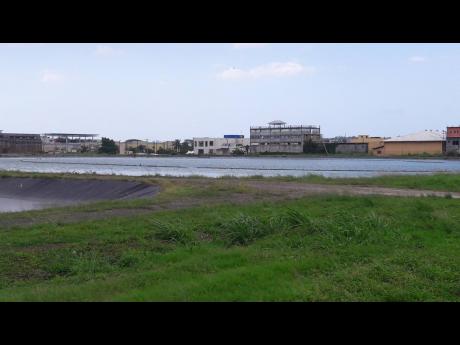What a mess! - Stakeholders say Bogue sewage pond was reckless decision, stonewalling MoBay’s development
Western Bureau:
With an oversubscribed demand for commercial space in Montego Bay, stakeholders are bemoaning a decision by the Government to establish a sewage treatment pond in the Bogue area of the Second City.
The P.J. Patterson-led administration had taken the decision to establish the plant in an undeveloped area on the western outskirts of the town in the 1990s, but with the city experiencing exponential growth, especially over the last decade, the sewage ponds are now smack in the middle of the new commercial heart of the tourist capital and residential developments.
Tourism Enhancement Fund Chairman Godfrey Dyer said the decision to establish the National Water Commission facility was made without the input of stakeholders from the resort town.
“If we (Montegonians) were sitting on [state] boards and taking decisions [on matters] that affect us, that sewage pond would not have been where it is,” Dyer said at recent event in Montego Bay.
“Winston Dear and I, and a couple of others, raised hell about the decision, but Dr Vin Lawrence and a few others just brushed us off and didn’t pay us any mind. Today, it’s in the middle of our town,” Dyer lamented.
BULLIED INTO SELLING
Mark Kerr-Jarrett, managing director of Barnett Estate, from whom the Government acquired the property, told The Gleaner that he was bullied into selling the lands.
“When they first came to us to compulsory acquire it, we resisted it for over two years, and Mr Dear and Mr Dyer are partners in that, because we believed it was a reckless move. It was a waste of prime real estate needed for the expansion of Montego Bay,” Kerr-Jarrett said.
“But after two years, we were strong-armed into selling it. We were basically threatened with some very dire circumstances if we did not offer it for sale, and if the Government had to go in and execute compulsory acquisition, we would have been heftily penalised,” Kerr-Jarrett explained. “When we did sell it, we got pennies on the dollar for its value, and unfortunately, the majority of Montego Bay, I don’t think understood at the time the long-term ramifications that the acquisition would have caused.”
According to the renowned land developer, who is also a past president of the Montego Bay Chamber of Commerce and Industry and a former chairman of the St James Parish Development Committee, the matter is now water under the bridge, but it’s a reflection of the arrogance and ignorance with which Kingston-based decision-makers handle the affairs of Montego Bay.
Kerr-Jarrett agrees that for the city to have developed the way it has, it was in need of an expanded sewage treatment facility, but he said that had there been proper representation from the Second City on the respective national boards, a more feasible alternative would have been found.
“We believed at the time, having gotten an engineering analyst, that they could have expanded the mechanical plant at Bevin Avenue, and that would far exceed whatever the sewage treatment pond could do, but that was discarded,” he said.
Despite this, Kerr-Jarrett is not in support of any plan to relocate the sewage pond from Bogue.
“It definitely created a wall which the development can’t go over, and I think the success of the Fairview development indicates the direction of the natural progression that Montego Bay should have taken,” argued Kerr-Jarrett, who is an engineer by profession. “[But] at this stage that would constitute another reckless decision, similar to that which was done in the ‘90s to having it built there in the first place.”
“The money that it would cost the Government now to relocate and build a better facility would be far better spent elsewhere, even [in] crime fighting, national security, education, healthcare and large low- and middle-income residential housing starts,” he suggested.
For Dyer, he has taken some comfort in the reality that persons from western Jamaica are now being selected to sit on national boards more consistently, meaning locals now have a say as to what is in their best interest.

